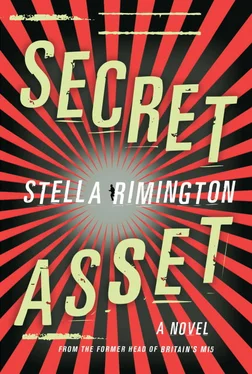“Okay. That shouldn’t be too much of a problem.”
And ten minutes later, having carefully brushed away the sawdust made by his drill, and carefully closing over the small drilled hole with filler, the man jumped down and, getting up on the chair, replaced the trapdoor. “I’m done up there. Anything else need doing?”
His colleague shook his head. “I’ve got two mikes in—one’s in the plug in the corner, and the other’s in the back of the VCR.”
“Have you checked them with Thames?”
“Yes, they can hear them loud and clear. Come on.” They went downstairs and collected their other colleague, who had put three listening devices in place, one above the inside of the shop’s front door, another in the owner’s small office, and a third in the stockroom in the back. Now even the faintest whisper made on either floor would be heard in Thames House.
Across the street, Doris Feldman poured hot water onto a tea bag for the nice young policeman who had rung her bell. He knew all about the strange goings-on across the street, and had even suggested they might want her help. She didn’t see the same three figures slip out of the front door of the bookshop and disappear into the night. But by then Doris was no longer worried.
Peggy Kinsolving had met Geoffrey Fane only once before, when he had spoken at her induction course when she first joined MI6 a year or so ago. She couldn’t recall much of what he’d said that day but she remembered the tall, heron-like figure and the chilly handshake.
The second meeting was briefer but what he said was more memorable. He was seconding Peggy to MI5 for a month or two, he announced, on a very important assignment that was so confidential she would have to sign a special indoctrination form. She would learn more when she got to Thames House. The one thing Fane wanted to stress was that she should not forget where her loyalties lay. “Don’t go native on us,” said Fane sternly. “We wouldn’t look kindly on that.”
This had taken some of the gloss off the excitement of her new posting, though Henry Boswell, her direct boss—a nice, well-meaning man, looking forward to his retirement—had tried his best to cheer her up. “It’s a marvellous opportunity,” he said, about her temporary move to the other side of the river, but she sensed he had no idea what it was all about.
Peggy couldn’t help wondering why, if it were such an important job, Fane himself hadn’t briefed her on it. And why (Peggy was being honest with herself) they were lending MI5 someone so junior. Part of her wondered whether MI6 had already decided they did not need her particular skills and whether she was just a pawn in some personnel deal between the two services.
But no, there was a real enough job to do. The following day at Thames House, Charles Wetherby had talked to her for over half an hour. He’d been friendly, and had answered all her questions seemingly very frankly. Wetherby had the rare ability to talk to someone as junior as Peggy as if she were his equal. After her session with him, she was no longer in any doubt about the importance, in Wetherby’s eyes, of what she was going to be doing.
He had explained that Peggy would be working with Liz Carlyle, an experienced and extremely talented investigator, he said, who had particular skills in assessing people. Liz would be leading their two-man team and they would be working direct to him. He would be keeping Geoffrey Fane informed of what they were doing. As Wetherby explained the situation, Peggy began to understand why she had been chosen. She would be following the paper trail and supporting Liz as she made her investigations. This made perfect sense to Peggy. She knew and loved the world of print, fact, data, information—pick your own word, thought Peggy—that was what brought out her skills. It was her métier. She could disinter information which might seem meaningless and sterile to others, then, like a primitive fire maker blowing on a spark, bring it to life. Peggy saw drama where others saw dust.
• • •
Peggy Kinsolving had been a shy, serious child, with freckles and round spectacles. A cheerful aunt had once called her Bobbity Bookworm and this had stuck in the family, so that from the age of seven, everybody called her Bobby. She had taken her nickname with her to her school, one of the few remaining Midlands grammar schools, and on to Oxford. At the end of three years’ hard work she had a good 2:1 in English and vague scholarly ambitions. There was not enough money in the family to support her through a DPhil so she left Oxford with no very clear idea of what to do next. At that stage of her life Peggy was certain of only two things: if you did your best and stuck at it, things would turn out well, and you should not put up with anything you didn’t like. Accordingly she had reverted firmly to the name Peggy.
For want of any better idea Peggy had taken a post with a private library in Manchester. The understanding was that she would assist the readers half the time and the rest of the time was hers. But since only an average of five people a day made use of her services, she had been largely free to pursue her own research into the life and writings of a nineteenth-century Lancashire social reformer and novelist. Why had it palled so fast? For one thing, her topic turned out to be rather drier than she had expected, with not enough facts to satisfy her voracious appetite for detail. For another her days were overwhelmingly solitary, and she had found no way of peopling her evenings. The Miss Haversham–like librarian rarely exchanged a word with her and scuttled off home as soon as the library closed. From this solitude came a growing conviction that however vivid a world she found in books and manuscripts, the world she saw when she lifted her head from the pages was tantalisingly more promising if only she could find a way into it.
She knew she had to leave, and the obvious alternative was London, where her manifest skills earned her an interview, and then an offer of a job, as a research assistant in the British Library. But the clinical, subdued atmosphere of the modern reading rooms struck her as even less acceptable than the tensions of a working day with Miss Haversham and she never knew what she would have done if an old acquaintance from college had not come into the library one day and told her of a specialised government department that was looking for researchers.
Which was how, at the age of twenty-five, still with round spectacles and freckles, Peggy came to be sitting in the conference room in Thames House next to Liz Carlyle, with half-drunk cups of coffee and a plate of biscuits on the table before them, along with several stacks of file folders, which Peggy had already accumulated after only six days in the job.
Though initially Peggy had approached her with some caution, she had liked Liz from the start. Peggy’s previous boss in the library, although herself female, had seemed to resent her on grounds both of age and gender. But Liz was younger, Liz was polite; best of all, Liz was straightforward. Peggy felt from the start they were a team, and the division of labour was clear. Liz would focus on interviews, while Peggy would do the research.
She had spent her first days with B Branch, the personnel department, reading files, taking notes, organising a hunt, which her unfamiliarity with the records system made more difficult than she expected. Liz was going to Rotterdam the next day, and had asked Peggy to brief her on her progress before she went. She handed Liz the first of what she knew were going to be many, many documents. This is the beginning, Peggy thought to herself. But what if there is no needle in the haystack?
Liz was surprised. There were only five employees of MI5 who had attended Oxford during the first half of the nineties, and she knew three of them. Perhaps not so remarkable as they were broadly the same age as she was. She looked again at the list Peggy had handed her:
Читать дальше












